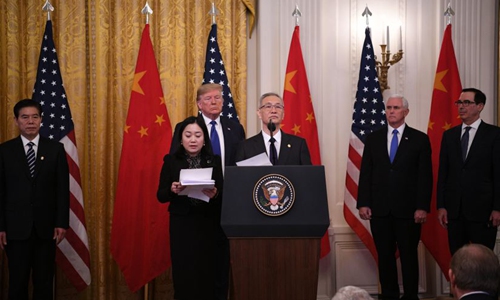HOME >> OPINION
Despite phase one deal, some Americans stuck in old mind-set
By Ai Jun Source:Global Times Published: 2020/1/16 21:13:42

Chinese Vice Premier Liu He speaks during the China-US phase one trade deal signing ceremony held in the White House on Thursday. Photo: Xinhua
When some media analyze in a paranoid way over which country wins in the phase one trade deal between China and the US, they miss the point. The significance of the deal is that Beijing and Washington resolved some of their major disputes through negotiations on an equal footing, with mutual understanding and rationality. It means China and the US are not enemies.Since Washington launched the trade war against Beijing, voices portraying China as a US enemy have been running wild in the US. As a result, some Americans believe even if the two reached an agreement, the US would be the loser. Worse, some continued to find fault with China's political system and ideology during the process.
Hours after the phase one deal was inked, such voices reached a peak. US House Speaker Nancy Pelosi issued a statement saying "instead of standing strong for human rights, President [Donald] Trump showed he would quickly cave in to curry favor with Beijing." Similar rhetoric had been emerging before the deal took place. In November 2019, Republican Senator Rick Scott said "we should all be united and speak with one voice in support of the people of Hong Kong… It's more important than a trade deal."
These people do not really care about the trade issues, intellectual property (IP) or technological transfer. Instead, they directly touched China's bottom line.
Politically and ideologically, they have taken China as an enemy. Some Americans are against China regardless of which topic people are discussing. Setting aside so-called freedom and democracy, they call China a job killer and IP thief, demonizing the country and its policies, such as Made in China 2025. They have created the impression that all American elites are united in confronting China and their only divergence is how. They have one goal - forcing China to step on the path the US has designed, otherwise, China can only be viewed as an enemy.
Beijing and Washington are different in system and ideology. Because of this, it is natural for them to encounter contradictions. Yet, this should not be the reason for the two to turn hostile toward each other. Why can't they find a way to coexist and cooperate?
China is not a US rival or enemy and is willing to unlock their disputes through talks and negotiations. Only when Washington abandons its mind-set of regarding Beijing as a foe can the bilateral relationship find a way out.
There are still sober-minded people in the US who do not believe China is an enemy. But both sides should be vigilant - some forces, especially those in the US Congress, are encouraging the US to confront China in every category, forcibly and unilaterally turning China into an enemy. The trend will play a key role in the next phase of negotiations.
The phase one trade deal has sent a signal - treating trade conflicts as a war while viewing the opposite side as an enemy is a mistake. No country can claim victory in trade wars, but consensus between China and the US can be found, eventually.
Posted in: OBSERVER